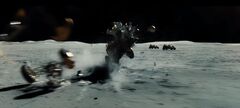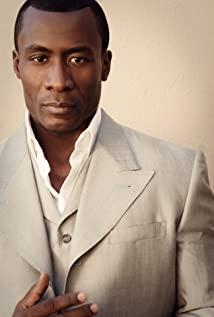Personally, this is an underrated space exploration film, even if his many hard flaws detract from what he reveals.
In fact, we are never unfamiliar with space exploration-themed movies. Only from the past few years, "Space Rescue", "The Martian", "Gravity", "Interstellar" and so on. Some people may classify it as a single reason caused by the era and technology, but it may also be that humans are curious about the light sources in the dark whenever they look up at the stars. Of course, it may also be the lack of sci-fi movies on the market. and other commercial factors.
The common point of this type of film, apart from some elements of excitement and thrills added to attract the audience, I am more curious about some philosophical reflections revealed by him. It is true that Christopher Nolan's films may have created a fad to understand a number of theorists such as Freud, Einstein, Hawking, etc., but what seems to be reflected in space films is a relationship between man and the universe . Of course, this is not just about self-cultivation, sitting on the beach and meditating to absorb the essence of heaven and earth, but the insignificance of human beings in front of space. No matter how advanced technology is again, a glitch is often the price of life; no matter how noble the spirit of exploration is, it may be futile in the face of almost infinite time and space; no matter the passion for finding extraterrestrial life, it will gradually become lonely in the boundless darkness. It seems a bit deterministic, all human power seems to be classified paternalistically as humility to nature, despair of human nature. Is it true?
The first and foremost theme in this film is the relationship between the Father and the Son. Roy (hereinafter referred to as R) father Clifford (hereinafter referred to as C) is a cosmic exploration hero, graduated from the US Air Force School, MIT Ph.D., the first to explore Jupiter, Saturn, and as a human pioneer to search for extraterrestrial life. And R is also an excellent astronaut, with excellent tests and an extraordinary calmness. However, the relationship between the two showed the seeds of love and hate in childhood. The son's worship of his father's achievements is also accompanied by resentment and disappointment for his father's disregard for his family, as well as the great pressure of his father's halo in the process of his growth. After his father disappeared, R embarked on the process of finding his father and gradually changed himself. Knowing that his father is still alive (Pitt's acting is really good here), knowing that the culprit of "The Surge" may be his father, knowing that his father executed a "traitor" to explore the great cause, knowing that his father did not Without replying to the Mars information, he learned that his father's futile and helpless persistence for 30 years, to accepting his father's determination to die, R was dealing with a struggle of constantly approaching his father and self-growth, and he also ignored his wife's. Feeling, refusing to have children, he also ignored the distress signal for the mission, and also killed the three Perseus people (intentionally or not) in order to find his father... The tragedy of people resisting before the fate of God in the Oedipus complex , why not R? "Children will always carry the sins of their fathers". If we have to rise to a universal understanding of space exploration, then behind every exploration is the loss of blood, and behind Gaoge's great exploration is often the deformity of family relationships and the collapse of individual emotions. Behind every decision is a silent bearer.
Interestingly, in the entanglement of this father-son relationship, the color scheme of the film has changed, from the colorful and approximate line drawing on the earliest earth, to the black on the moon, the red in Mars, and the blue of Neptune:
Off topic, as for this blue, it reminds me more of the lady in Kislowski's "Blue" who is transferred into the swimming pool:
The infinite space is cold, lonely, the final outcome of father and son; the empty swimming pool is cool, screaming, the final explosion of a woman. Blue here symbolizes not only melancholy deep into the bone marrow, but also a philosophical sense, a kind of forbearance, which accumulates all the previously silent complexes into a burst of torrents until everything returns to silence.
In this movie, father and son are the carriers. What should be the status of people in space exploration?
I think that's also the second theme that the film deals with - the disappointment and irony of human nature. The most impressive thing is that Virgin Atlantic has developed a space route from the earth to the moon. When entering the moon, the broadcast said that many mining areas on the moon belong to disputed territories and are at war. And what R saw after landing on the moon was an extremely commercial lunar space station such as aliens and rocket toys. Wherever humanity goes, consumerism, and the struggle for power and profit, will come one after another. The cosmic ladder we saw at the beginning of the movie seems to think that the earth has become the "Earth Federation" and so on to establish this spectacle for the benefit of all mankind, but when clues such as the US Space Combat Force appear, we can vaguely deduce that in this future Humanity is still a unit of state, although it is possible that these public projects are the product of collective cooperation. The countless bureaucrats and psychological assessments that appear in the play allow us to see that future politics will have a firmer control over individuals. What is even more worrying is that the government is still fictionalizing heroes of cosmic exploration, just as people show the best side of exploration, the greatest spirit of human exploration, but ignore the differences, betrayals, and ethical struggles that lead to tragic deaths.
Of course, compared with Nolan's "Interstellar," the film's shortcomings are also revealed. It all echoes the beginning and the end, the male protagonist's daughter, and R's psychological evaluation, but why does "Space Exploration" always feel that it is not so meaningful and so memorable? The story structure of the two is similar, and even the routine of the former's exploration of two planets can be found in R's encounter with lunar robbers, baboons, and meteorites. This method can increase the breadth of coverage of the film, and then give people a sense of vast space. "Space Exploration" is closer to reality, so that we can understand that this is what human beings may develop in a few years, so there is no big fall. Both are reflective philosophies, but why does "Interstellar" make us feel like we have a lot to say but can't say, and "Space Quest" just leaves us unsaid? Too big a structure will always lose the focus and make people confused.
But on the whole, if this movie is two or three, you will see a lot of very good philosophical ideas that are covered up, let us know that this is not just a Pitt popcorn show. At the end, I suddenly remembered that after R finished talking in the psychological evaluation, the psychological evaluation did not give a clear answer. Perhaps the affirmation of R's inner growth and experience is in the hearts of our audience.
View more about Ad Astra reviews











